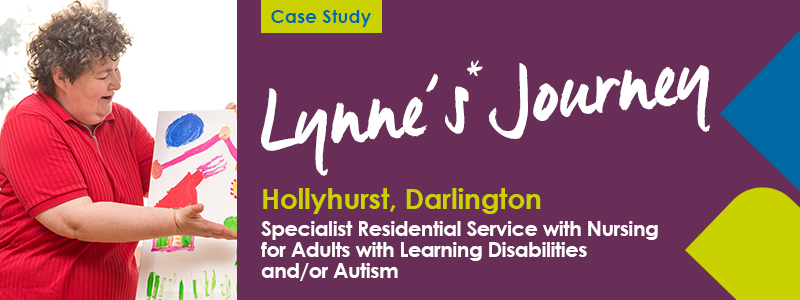
Lynne’s* History
Lynne is a woman in her fifties with a unique history and complex needs. She has diagnoses of a moderate learning disability, epilepsy, and hypomania, which significantly impact her life.
As a child and teen, Lynne faced many challenges. She attended a residential school until aged 16, her mother struggled with her own mental health, and Lynne was witness to domestic violence. These experiences made it difficult for Lynne to trust others.
Lynne spent much of her life accessing care homes, hospitals and residential placements. Her feelings of distress manifested as violence and aggression towards staff. During 2022, she was moved through a number of different services which weren’t right for her.
It was identified that Lynne required long term residential support from a service that was experienced in supporting people with complex needs. She joined us at Hollyhurst at the end of 2022.
When Lynne came to us
Lynne moved in and brought with her a bright and engaging personality. She had spent time at a care home for people with higher risks than herself, which unfortunately meant that she was unable to access activities that helped to ease her anxiety, such as knitting. The team identified that it was a priority to offer her a full activity programme as soon as possible.
Social interaction was a challenge for Lynne, she often spent time alone and felt uncomfortable being out and about in the local community.
Lynne’s care
The team at Hollyhurst spent time getting to know and understand Lynne. It became clear very quickly that she was highly creative and had been missing having a creative outlet. Staff reintroduced Lynne’s crafting materials which helped to lift her mood. They incorporated time for crafts into a structured daily routine to give Lynne some comfort through consistency.
Initially, Lynne was happy to craft alone and would make bags and coasters. As her confidence grew, she enjoyed baking sessions with staff. The baking not only increased Lynne’s independence, but also her social skills, as she invited other residents to try her bakes.
With Lynne’s newfound confidence and trust in the team, she was open to working with the multi-disciplinary team (MDT) to improve her communication skills. This was a key part of achieving her goals to build positive relationships and feel confident in community settings.
The Hollyhurst team invested considerable time into helping Lynne integrate into the Darlington community. After visiting a local hairdresser, it soon became a weekly occasion, where she has become a well-known and cherished presence amongst the staff and customers.
Several months in to her placement at Hollyhurst, the team noticed signs that Lynne was withdrawing, and incidents of aggression started to rise – exactly how her previous placement described her decline before the placement breakdown. The team immediately completed a comprehensive peer review, exploring all possible avenues that could explain the changes. They found there was a correlation between the time of year, seizure activity, and incidents of aggression. A medication review was completed including Lynne’s GP, neurologist and psychiatrist. Once the adjustments were made, Lynne returned to the positive, determined woman they had seen before.
Lynne today
Lynne is absolutely thriving at Hollyhurst. The team encourage her passions, which has led to Lynne offering her bakes on a monthly basis to other residents using her very own tea trolley. She spends less time alone in her room, and often chooses to enjoy activities in the communal spaces.
Lynne’s passion for creative activities, remain a central part of her life. These activities not only bring her joy but also offer opportunities for her to further strengthen the relationships she has with other residents.
Incidents of challenging behaviours are few are far between, showing a real sense of comfort and security for lynne. She enjoys stability in her environment, which has had a profoundly positive impact on her overall well-being.
“From the moment Hollyhurst became part of this ladies care team they have shown her so much support, empathy, kindness, enthusiasm and resilience. She has struggled greatly at times but the team strived to find different approaches and ways to support her, preventing an admission to hospital under the Mental Health Act. Her quality of life has increased so much more than ever before, resulting in her accessing lots of different activities in and out of the home.”– care professional
*Name has been changed to protect her identity




